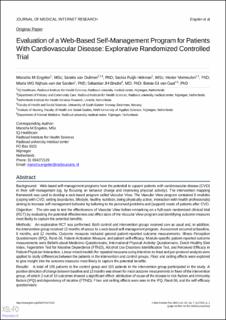| dc.contributor.author | Engelen, Marscha M. | |
| dc.contributor.author | van Dulmen, Sandra | |
| dc.contributor.author | Puijk-Hekman, Saskia | |
| dc.contributor.author | Vermeulen, Hester | |
| dc.contributor.author | Nijhuis-van der Sanden, Maria W.G. | |
| dc.contributor.author | Bredie, Sebastian J.H. | |
| dc.contributor.author | van Gaal, Betsie | |
| dc.date.accessioned | 2021-03-25T11:04:24Z | |
| dc.date.available | 2021-03-25T11:04:24Z | |
| dc.date.created | 2021-02-21T13:50:14Z | |
| dc.date.issued | 2020 | |
| dc.identifier.citation | Engelen, M. M., van Dulmen, S., Puijk-Hekman, S., Vermeulen, H., Nijhuis-van der Sanden, M. W., Bredie, S. J., & van Gaal, B. G. (2020). Evaluation of a Web-Based Self-Management Program for Patients With Cardiovascular Disease: Explorative Randomized Controlled Trial. Journal of medical Internet research, 22(7), e17422. | en_US |
| dc.identifier.issn | 1438-8871 | |
| dc.identifier.uri | https://hdl.handle.net/11250/2735501 | |
| dc.description.abstract | Background: Web-based self-management programs have the potential to support patients with cardiovascular disease (CVD) in their self-management (eg, by focusing on behavior change and improving physical activity). The intervention mapping framework was used to develop a web-based program called Vascular View. The Vascular View program contained 6 modules (coping with CVD, setting boundaries, lifestyle, healthy nutrition, being physically active, interaction with health professionals) aiming to increase self-management behavior by tailoring to the perceived problems and (support) needs of patients after CVD.
Objective: The aim was to test the effectiveness of Vascular View before embarking on a full-scale randomized clinical trial (RCT) by evaluating the potential effectiveness and effect sizes of the Vascular View program and identifying outcome measures most likely to capture the potential benefits.
Methods: An explorative RCT was performed. Both control and intervention groups received care as usual and, in addition, the intervention group received 12 months of access to a web-based self-management program. Assessment occurred at baseline, 6 months, and 12 months. Outcome measures included general patient-reported outcome measurements: Illness Perception Questionnaire (IPQ), Rand-36, Patient Activation Measure, and patient self-efficacy. Module-specific patient-reported outcome measurements were Beliefs about Medicines Questionnaire, International Physical Activity Questionnaire, Dutch Healthy Diet Index, Fagerström Test for Nicotine Dependence (FTND), Alcohol Use Disorders Identification Test, and Perceived Efficacy in Patient-Physician Interaction. Linear mixed models for repeated measures using intention-to-treat and per-protocol analysis were applied to study differences between the patients in the intervention and control groups. Floor and ceiling effects were explored to give insight into the outcome measures most likely to capture the potential benefits.
Results: A total of 105 patients in the control group and 103 patients in the intervention group participated in the study. A positive direction of change between baseline and 12 months was shown for most outcome measurements in favor of the intervention group, of which 2 out of 10 outcomes showed a significant effect: attribution of cause of the disease to risk factors and immunity factors (IPQ) and dependency of nicotine (FTND). Floor and ceiling effects were seen in the IPQ, Rand-36, and the self-efficacy questionnaire.
Conclusions: No conclusion for the efficacy of the Vascular View program or selection of outcome measurements can be taken yet. A process evaluation will be conducted to gain thorough insight into the working elements of the program, patient needs in eHealth, and the use of the program by patients. This can determine for whom web-based self-management programs will work and help to adapt the program. | en_US |
| dc.language.iso | eng | en_US |
| dc.rights | Navngivelse 4.0 Internasjonal | * |
| dc.rights.uri | http://creativecommons.org/licenses/by/4.0/deed.no | * |
| dc.title | Evaluation of a web-based self-management program for patients with cardiovascular disease: Explorative randomized controlled trial | en_US |
| dc.type | Peer reviewed | en_US |
| dc.type | Journal article | en_US |
| dc.description.version | publishedVersion | en_US |
| dc.rights.holder | © 2020, Marscha M Engelen, Sandra van Dulmen, Saskia Puijk-Hekman, Hester Vermeulen, Maria WG Nijhuis-van der Sanden,
Sebastian JH Bredie, Betsie GI van Gaal. | en_US |
| dc.source.volume | 22 | en_US |
| dc.source.journal | Journal of Medical Internet Research | en_US |
| dc.source.issue | 7 | en_US |
| dc.identifier.doi | https://doi.org/10.2196/17422 | |
| dc.identifier.cristin | 1892100 | |
| dc.source.articlenumber | e17422 | en_US |
| cristin.ispublished | true | |
| cristin.fulltext | original | |
| cristin.qualitycode | 2 | |

